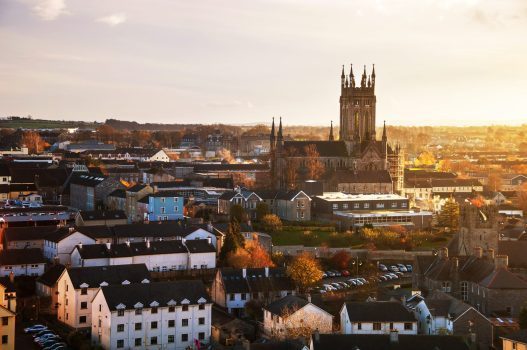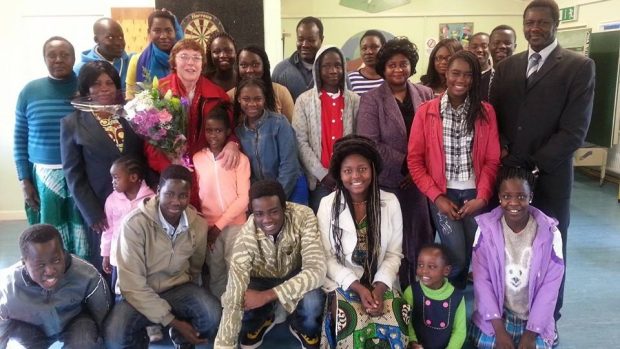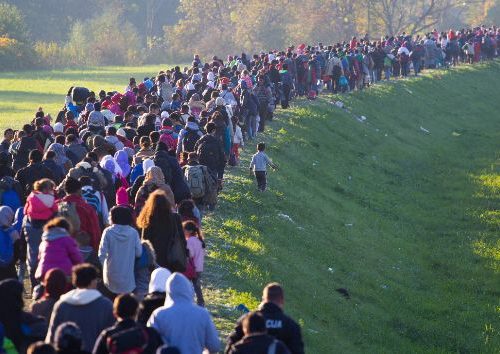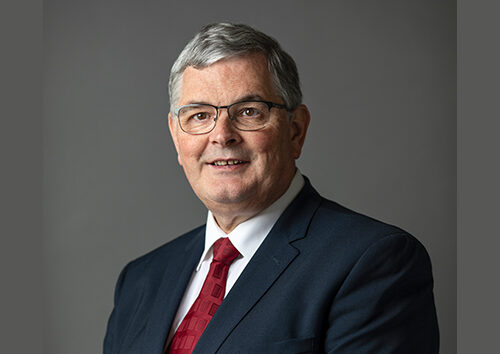15 June 2023 | St. Albans, England [David Neal with ADRA Europe]
“Hello there. Are you Evelyn Wilson? I wonder if you can help me.” It was the opening question of perhaps the strangest and most unique call Irish Mission member Wilson had ever received, and was the beginning of a ministry journey that would last almost a decade.
Wilson had and continues to have a passion for loving people, of whoever they are, whatever their situation, and not least, from wherever they come. It was back in 2010 when she received that unexpected call from a stranger – the ‘Irish Aid’ official, the international development arm of the Irish government’s Department of Foreign Affairs. The first direct question was quickly followed by the next. “Are you a Seventh-day Adventist?”
“Yes”, Evelyn cautiously replied, not knowing where the conversation was going, for it was not every day she received a call from the Irish government. “Why do you ask?” she continued.
“I need your help”, replied the official. “You see, just arrived in Ireland, at the invitation of the Irish government, are 75 Sudanese refugees. They are saying they are Seventh-day Adventists. I know absolutely nothing about your Church, whether it even exists in Ireland, but after some searching around a colleague suggested I contact you.”
How do you know they are Seventh-day Adventists?
At this point, Wilson was in a bit of a spin. On the one hand she was thrilled at being approached by the government for help. On the other hand, how could she possibly help? Still surprised by the request she asked an obvious question. “How do you know they are Seventh-day Adventists?” And then she received perhaps the strangest identifying mark of an Adventist ever given. “Because they have songbooks,” replied the official. And sure enough, in the songbooks they carried with them was the Adventist Development and Relief Agency (ADRA) camp stamp.
Due to the continuing tribal and political tensions of South Sudan, a civil war lasting from the 1990’s and into the first two decades of the 21st century, the displacement of people was inevitable, with many fleeing into the neighbouring country of Uganda. It was in Uganda that ADRA had reception camps. And whatever else practical care ADRA provided, each refugee was given a songbook!
In collaboration with Irish Aid who was also working in Uganda at the time (circa 2009/2010), the refugees were resettled into the city of Kilkenny, 80 miles south-west of Dublin. Following the 2008 economic crash, Ireland experienced a serious housing crisis – not a shortage, but a surplus of thousands of brand-new houses, standing empty in what became known at the time as ‘ghost towns’.

Into vacant houses the refugees were settled. Perhaps not knowing what to expect when I met them for the first time, I was shocked. Familiar as I was engaging with members from the global south who had moved north for economic and social reasons, this people in this group were different.
A mix of mature adults, youth, teens, and children, all looked in a visible state of shock moving from their dry equatorial climate to the cold wetlands of Ireland. But deeper than that, there was one seemingly elderly lady, who looked as if she was aged between 60-70, but who, I came to understand was only aged between 45-50. While it was clear she spoke no English, the only body language she gave was – the stare. Superficially it would be easy to conclude that she was simply bewildered about the move. But I dared to wonder about the traumatic experiences she had been through. Sadly, she was not the only person in the group to be withdrawn.
The recent history of the war in Sudan is littered with peace plans made and broken, indescribable atrocities and with human rights abuses occurring on both sides. “Atrocities and human rights abuses” – an easy and familiar line to quickly pass over as a soundbite. But dig behind the headline and we find killings, acts of sexual violence, abductions, detention, torture, the recruitment of children, the destruction of civilian property and massive population displacements.
As for the refuges resettled in Kilkenny, Ireland, I thank God for the compassion of the Irish government. I thank God for the work of Evelyn Wilson who ministered to that group for almost a decade, providing every level of practical, social, and spiritual care she could offer – love in action without question. And it should not go unnoticed that for her sacrificial love, the ‘New Irish’ in Kilkenny accepted and loved her as their pastor and spiritual leader!

Predicted to be a Century of People on the Move
In their 2022 ‘Global Trends’ report the UN Refugee Agency reported that by year end of 2021, 89.3 million people were ‘forcibly displaced worldwide’ because of persecution, conflict, violence, human rights violations, or events seriously disturbing public order. A further 94.6 million people are described as ‘of concern’.¹ For 2023 and because of the war in Ukraine, the number of refugees may well have reached over 100 million people.
Without a doubt, as the 21st century passes through its second decade, one thing is clear – the global paradigm of the 21st century is going to be a century of people on the move! This is for several reasons says António Guterres, Secretary General of the UN, on record as saying, “Displacement patterns had changed over the years, and further dramatic changes were likely. Population growth, urbanization, climate change and food, water and energy insecurity were all compounding instability, triggering conflicts and creating new patterns of forced displacement.”
Whether a refugee walks across the sandy lands of South Sudan, or the fertile but war-torn lands of Ukraine, from the moment they are forced to leave their home until the time when they can feel totally resettled again, in both physical and emotional terms, can take up to a decade to resolve.
This says to me that supporting refugees requires long-term commitment. Initially, they may be supported in a temporary camp, or place of safety. But that is temporary until they can ‘move on’. For example, in my East Midlands UK hometown of Grantham, the local Christian community continues to support refugees through computer and English language classes. While many refugees continue to be housed in tents in temporary camps – more are now more likely to be resettled closer to us our in our villages, towns, and cities.
May the Lord give us open hearts, and open doors to support our new neighbours. Where we see such need let’s pray for the Lord to move our compassion into action, and love as he loved – to all without exception.
¹The UN Global Refugee Agency, Global Trend Report 2021
[Photo: Shutterstock]



